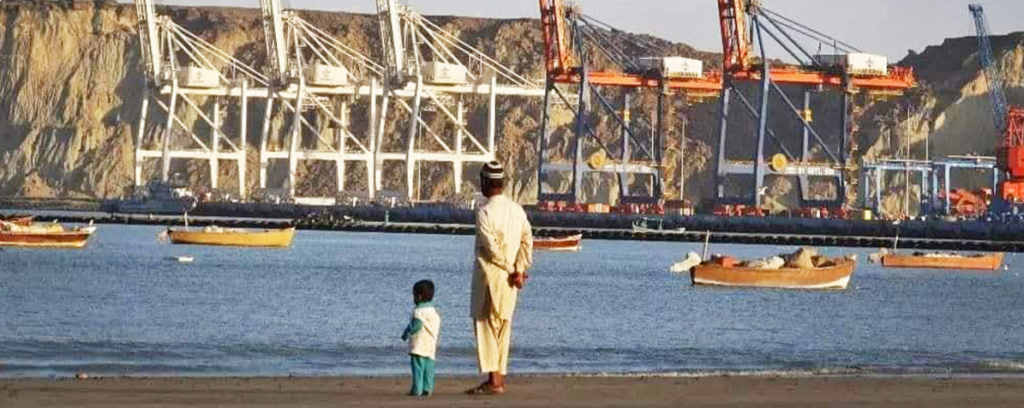
In late February, a flash flood hit Gwadar, a port city on Pakistan’s southwestern coast in Balochistan province. The 183 millimeters (7.2 inches) of rain that fell in 30 hours was double what the city typically gets in a year, and it exacted a heavy toll. At least five people died, and more than 800 had to leave their homes because of stagnant sewage water. The storm damaged thousands of homes and shops, inundated farmlands and killed hundreds of livestock.
Residents shared videos online showing flooded streets and homes, and they criticized the lack of government response. Protests broke out as hundreds of people took to the streets, chanting, “Take water out of our houses,” “Stop helping the influential” and “We want our rights.”
In already fragile areas like Gwadar, extreme weather can fuel conflict and be a threat multiplier, according to recent research published in the journal Alternatives: Global, Local, Political.
“The grievances of the Baloch people against the state of Pakistan stem from inequality, human rights violations, lack of necessities and noninclusive governance,” Muhammad Makki, an assistant professor at the Centre for International Peace and Security at the National University of Sciences and Technology in Islamabad and lead author of the study, told Mongabay by phone. “Climate calamities like floods and droughts worsen these issues and further destabilize development.”
Over the past six years, Gwadar has been beset by large protests and sit-ins, most reportedly linked to climate issues or government failures. In 2019, thousands of people, including women and children, protested against illegal Chinese fishing trawlers using wire nets banned by the government of Pakistan. Those wire nets caught not only fish but also their eggs. The practice threatened marine life and the livelihoods of local fishers.
Javed Baloch, a 27-year-old journalist from Gwadar, remembers the protest. “I was a student back then. Hundreds of women, children and young people demanded one thing: Let the fish live in the sea,” Baloch told Mongabay in a phone call. “Without fish, there’s no Gwadar.”
Gwadar sits in an arid region susceptible to droughts, groundwater depletion and rising sea levels, all of which climate change and extreme weather can exacerbate.
The city is built on dunes, creating uneven topography. It also sits in what scientists call a low elevation coastal zone, said Pazeer Ahmed, a hydrologist working for the government of Balochistan. That means less than 10% of the land rises above 10 meters (33 feet), and at the same time, the surrounding sea level is rising faster than global averages, Ahmed said.
“New wetlands are forming, and salt-resistant plants like giant reed are replacing native species,” he added. “If this continues, living in Gwadar will become very difficult.”
Balochistan’s conflict with the Pakistani state has focused on issues like national identity, control over resources and human rights violations. In recent years, however, climate justice has become a major part of this struggle. The Alternatives journal study analyzed trends around conflict in Balochistan and found that the impacts of climate change are worsening the conflict and making the Baloch people more resentful.
To understand the situation in Balochistan, the researchers focused on two of the province’s cities. The team’s interviews with community leaders, government officials and other stakeholders, along with group discussions with climate experts and security actors, revealed that weak governance, socioeconomic and political inequalities, and migration patterns can shape the way climate change influences conflict. For example, extreme weather events like floods and droughts disrupt livelihoods and can trigger migration, which may lead to tensions between communities and governing bodies.
This nexus between climate change and conflict in Balochistan didn’t appear overnight — it’s been building for generations. After Balochistan’s annexation in 1948, the Pakistani government began taking the province’s natural resources, such as minerals, gold, marble and coal, without any local involvement. The 1952 discovery of natural gas in Sui, Balochistan, helped to improve living standards across Pakistan, though the Baloch people continue to languish. At least six people, including children, died from a 2022 cholera outbreak in Dera Bugti district when a severe drought forced many to drink contaminated water.
This long history of exploitation in Balochistan has increased frustration and anger among the local people, making the situation in the region even more complicated. The national and provincial governments have failed to provide even the most basic facilities in the province, and it’s only worsened the disconnect between the people and the state.
Like Dera Bugti, Gwadar is also vulnerable to severe droughts, leading to a similar drinking water crisis. During the flood in February, residents of Gwadar said the provincial government hadn’t done much to fix the issue, and the national government didn’t seem to have a plan to end the water scarcity. On top of that, power outages are part of daily life in the city. Gwadar isn’t connected to Pakistan’s national grid and has to rely on electricity from Iran, which barely meets the city’s needs. Elsewhere, extreme heat waves create problems for residents. The study revealed that water and food scarcity triggers migrations in these areas.
Factors like human rights abuses, resource exploitation and poor governance have sparked turmoil in the province, and climate change is contributing as the threat multiplier. From drought in Dera Bugti to sea level rise in Gwadar, people are frustrated and becoming more hostile, resulting in large protests and agitations across the province. At the same time, the provincial government has done little to solve the problem.
Sources interviewed for this story highlight the absence of data-driven policies to address the link between climate and conflict in Balochistan. This gap in research and data has hindered solutions.
“We need to invest in data and create policies based on it,” said hydrologist Pazeer Ahmed. “Without data-driven strategies, it’s impossible to plan the necessary infrastructure.”
Makki agreed. “The lack of data on regional, tribal and social dynamics is a major issue,” he said. “Marginalizing and excluding Gwadar’s people from decision-making processes will only make things worse.”






